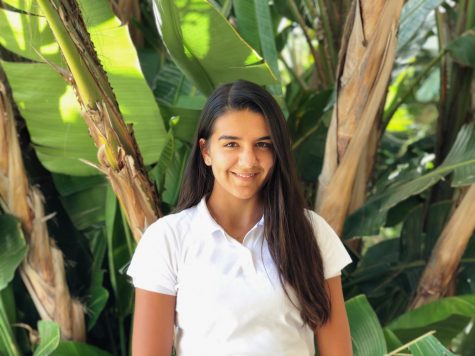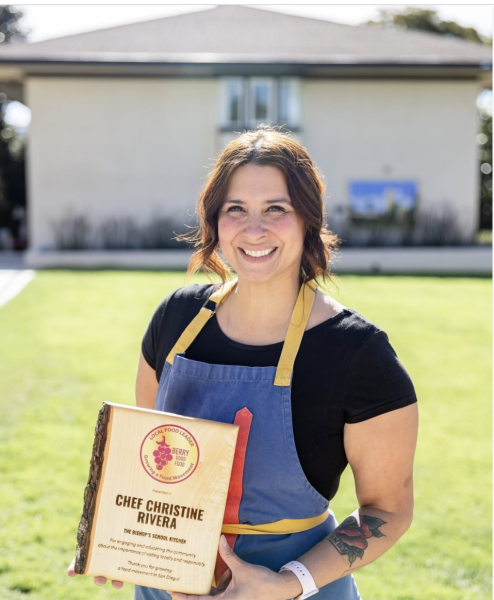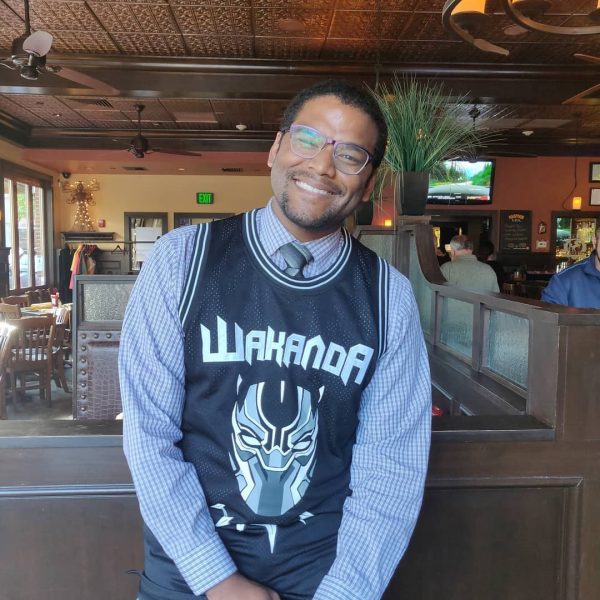Studying Solo: A look into the Independent Study program at Bishop’s

Senior Cate Freundt’s independent study focuses her passion for sewing into and entrepreneurial project: a bikini business.
You might have heard of an art kid doing an independent study to work on their AP portfolio, or just to continue with art once they finished Drawing and Painting I and II. But in addition to this, numerous students, particularly seniors, have turned to independent studies to accommodate unique interests like directing, sewing, music theory, and science research. So how are these students enjoying their courses, and how do these one-on-one programs cater to a different style of learning?
Independent Studies are course options that fall outside of the realm of the Bishop’s curriculum or the Global Online Academy. In order to apply for one, a student must identify the faculty with whom they wish to work and arrange a class period to meet at least two times a cycle. The idea of these specialized courses is for students to pursue unique interests—not, as the application notes, to fix scheduling conflicts by creating a one-on-one class section.
Even if it meets these requirements, an independent study might be denied if the student does not provide a clear reason why it must appear on their transcript, instead of being simply an off-the-books or extracurricular session with a teacher. “In some cases, students may realize that not transcripting a class allows them to enjoy the activity more,” the Independent Study Application states, “as well as affording them the flexibility to hit pause as needed.”
Around ten seniors have enrolled in the program this year.
Sancia Milton and Ellie Hodges, while both in separate art independent studies, were able to adapt the focuses of their courses towards their interests. “It was really important to me that I could fit an art class into my senior year schedule, but I was unable to wedge AP art into my courses,” Sancia said. In her independent study, which involves photography, drawing, and painting, she says she’s “specifically using art as a way to explore the ideas of self-esteem and self-worth.”
Ellie Hodges has been doing an art independent study since sophomore year. This year, in “Portfolio Building and Visual Arts Publicity,” she has had a chance to work on pieces individually, and “explore new mediums and styles.” Sometimes, she noted, she can work on other artistic projects aside from her pieces of visual artwork. “On occasion,” Ellie said, “[I] work on the Eye on Visual Arts” publication.
But many students have taken advantage of the independent study program to pursue some of their niche interests outside of the visual arts realm.
Senior Joseph Aguilar is doing an independent study in directing because a number of scheduling conflicts meant that he couldn’t take either of his performing arts classes (Bishop’s Singers and Acting Workshop). “I decided to take my education another step further and put myself on the other side of the rehearsal process,” Joseph explained.
He plans to co-direct the spring middle school musical with Performing Arts Faculty member Ms. Lara Korneychuk, as well as putting on his own show around the end of the school year.
While it might seem like the process of directing fully occurs on the stage, Joseph does significant amounts of preparatory work for his show. “Directing a show is a three-stage process: pre-production, production, and post-production,” Joseph explained. “I have been reading books on directing, writing documents that detail my vision for this show down to the smallest detail.” It’s about “making your directorial vision as refined as possible,” he explained.
Joseph has acted in numerous Bishop’s productions, including “Chicago,” “Les Miserables,” “She Kills Monsters,” and many more. However, he is enjoying the opportunity to approach theatre through the lens of directing. “Everything before auditions never quite concerns the actor,” he explained. “But the pre-production stages of directing are as important, if not more important, than the next two stages. If your pre-production work isn’t thorough, your production stage may fall apart.”
Senior Cate Freundt was in a similar situation at the beginning of the year as she faced scheduling conflicts. “The sewing class I wanted to take was cut [due to low enrollment],” Cate explained. She was able to develop a curriculum with Performing Arts and Costume Design Teacher Ms. Jean Moroney. In the course, she focuses on sewing and designing bikinis with the intent of selling them, combining business and creativity in a unique passion project. “It’s fun to be able to… pursue your interests,” she said.
Senior Maya Buckley is taking a music theory independent study, an unusual situation because music theory is typically a normal class. However, it was also cancelled this year due to low enrollment. “It’s also really fun because I have a pre-existing relationship with my independent study teacher [Director of Choral Music Dr. Christine Micu],” Maya said. “I feel like there’s a lot more flexibility than in a ‘regular’ classroom to ask questions or… apply lessons in a more interactive way.”
Dr. Micu, who has guided prior independent study projects in choral conducting and musical theater, agreed with Maya’s statement that one-on-one projects allow for increased flexibility. “We can study [music theory] from a vocal standpoint, which is her area of interest and talent,” Dr. Micu explained. “If she were taking the class, it would be a much different experience; much more structured and aligned with a textbook.”
Independent studies can also take on a college research style format. Senior Andrea Rix is working on a science research course entitled “Cellular Biology of Female Reproduction.” As co-president of the Period Poverty Project, she has a passion for fighting for menstrual equality and destigmatizing conversations around periods. She connected this with her passion for science research during her junior year. “I found that the two topics I naturally chose for our major research projects were both in the realm of reproductive biology,” she explained. “Feto-maternal immune tolerance in pregnancy and the evolution of menstruation.”
It’s a niche interest: one that Andrea would not have been able to explore without a one-on-one program. “I am a huge fan of independent study courses,” she said. “They allow students to dive deep into a specific interest that might not be done justice in a class with such a huge breadth as just ‘Chemistry’ or ‘English.’”
While these students tended to enjoy the individuality fostered by creating their own curriculum, several added that there were drawbacks to such a particular type of study. Dr. Micu, for example, pointed out that learning something alone takes away the community aspect. “I think it is definitely more fun to do musical theater with other performers—music… is more fun when it is a communal activity,” she explained. “I am not sure these drawbacks outweigh the ability to study something you are passionate about, however, especially when there is not a class offered.”
Other students explained that, due to the self-guided nature of the course, taking one requires a dedicated work ethic and a mindset free from procrastination.
“Doc and I meet once a cycle to discuss what I’ve been researching and talk about future paths that might be interesting,” Andrea said, “But the course is pretty much entirely self-led. I just ask myself ‘where do I want to go next?’ [and go there].”
Cate agreed with the idea of increased freedom, adding that the class involves a lot of “completing work on your own time.” In the middle of college application season for seniors, it’s “really difficult right now,” she said.
Joseph similarly explained that directing was an extraordinarily self-driven course. He noted that he viewed it not as a one-student class, but as a student-led class. “YOU are the teacher, and your supervisor is simply a guiding force,” he said. It isn’t something that would work for a student prone to procrastination, because he had to take responsibility for his own work and deadlines. “For you to gain something out of an independent study, you have to be passionate about what you’re learning,” he said. “Independent studies are giving passions an environment to grow and I think that’s great.”
Academic Dean Ms. Janice Murabayashi explained, “If students need more structure, interaction, guidance, or simply don’t have the time to work on a project on their own, IS [Independent Study] isn’t a good option.”

Clare Malhotra was born in Boston, Massachusetts and moved to La Jolla at age nine. She is currently a senior, and this is her third year on The Tower....





